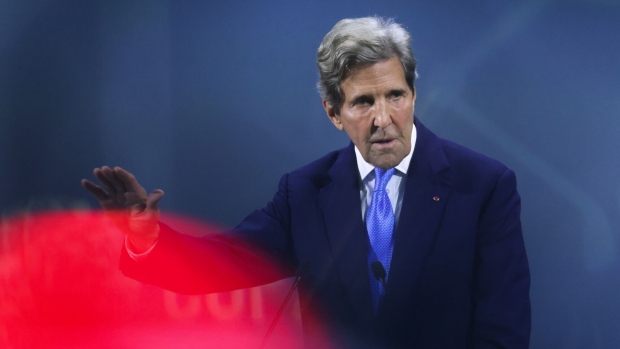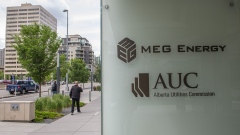Jan 13, 2024
Kerry to Step Down as Biden Administration’s Climate Envoy
, Bloomberg News

(Bloomberg) -- John Kerry, the top US climate diplomat, intends to step down after more than three years relentlessly pressing countries to get more aggressive in the fight against global warming, according to people with knowledge of the matter.
The former US secretary of state, senator from Massachusetts and Democratic presidential nominee will transition outside the federal government in coming weeks, said the people, who asked not to be identified because the announcement wasn’t public.
Kerry, 80, has made clear he won’t abandon the climate fight, even when he leaves government. He’s now expected to help Joe Biden’s reelection bid as the president seeks to court young, climate-minded voters. Kerry’s departure also may free him to devote more time to pressing for favorable policies and projects — including philanthropic initiatives he helped spur in his climate envoy role.
The White House didn’t comment on the development. The State Department declined to comment.
Kerry has been tackling climate change for decades, taking part in the first UN summit on the issue in 1992. But for the last three years he’s been Biden’s chief emissary on the issue, serving as a special presidential envoy for climate and ringing the world in pursuit of regional deals to advance clean energy and drive emissions cuts.
Kerry’s decision to leave follows UN climate negotiations in Dubai that produced a landmark agreement to transition away from fossil fuels that are contributing to planetary warming. His exit also coincides with the departure of his Chinese counterpart, Xie Zhenhua, who will be replaced by one of the country’s top diplomats, Liu Zhenmin, state-run CCTV said Friday.
Read More: US and World Face Reckoning on COP28 Climate Goals, Kerry Says
It’s not clear who might replace Kerry, a seasoned politician and diplomat who brought unusual gravitas to his role as the country’s chief international climate negotiator. Previously, the job has been held by bureaucrats who are steeped in diplomacy but lack the same high profile.
Kerry has enjoyed relatively easy access to Biden and shares a camaraderie with the president built during their shared service in the Senate. He’s also known around the world from his years as secretary of state — a status that facilitates his very personal brand of diplomacy, forged through relationships with world leaders.
In 2014, Kerry’s talks with China helped propel a joint statement on climate that laid the foundation for the landmark Paris Agreement a year later. And even as tensions over human rights, intellectual property and Taiwan complicated Washington’s relationship with Beijing, he has spoken optimistically about the opportunity for the US and China to find common ground and make progress on climate change.
That optimism bore fruit in November, when China and the US agreed to accelerate an array of climate action, by supporting efforts to triple renewable energy capacity by 2030, hasten the domestic buildout of green power to replace coal, oil and gas, and advance cooperation to limit emissions of particularly pernicious greenhouse gases. Elements of that joint statement formed a foundation for the final declaration that emerged from December’s COP28 climate summit in Dubai.
Read More: Top Emitters Vow New Climate Action in US-China Breakthrough
That pact fell short of Kerry’s push for greater ambition to limit the permitting of new, unabated coal-fired power plants and throttle fossil fuels. Nevertheless, Kerry hailed the deal — and the diplomatic process that forged it — as a success, saying countries had been clear and unambiguous despite the challenge in “finding common ground on something as broad and as complicated” as climate change.
Under Kerry and Xie, the US and China formed a working group to collaborate on battling climate change that’s meant to help sustain progress during the shift in envoys. During an initial, virtual meeting, Chinese and US officials discussed the energy transition and methane, among other topics.
Read More: US-China Climate Dealmaking Hinges on Two Diplomats’ Deep Ties
Although Kerry easily catalogs the ways the earth is already crossing irreversible climate tipping points — from melting sea ice to ravaged coral reefs — he is relentlessly optimistic about the ability of the world to adapt to and avert planetary warming. Companies, investors and executives are already making different decisions about their energy portfolios, and private-sector action advancing a green economy is beyond the reach of even climate-denying politicians, Kerry said last year.
“This is a sea change moment,” Kerry said as the COP28 talks concluded in December. The agreement by almost 200 countries to transition away from fossil fuels will encourage the clean energy shift and help ensure bankers and investors “will make a different set of choices.”
--With assistance from Justin Sink.
(Updates with detail on departure of Kerry’s Chinese counterpart in sixth paragraph.)
©2024 Bloomberg L.P.








